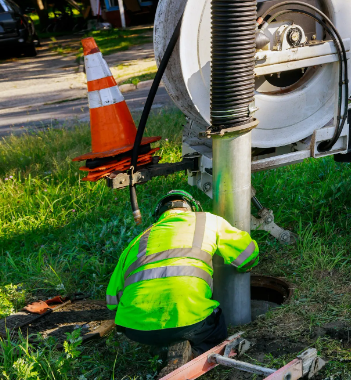When it comes to maintaining a home or commercial property, sewer line issues rank among the most disruptive and costly problems. For property owners and managers in the heart of Georgia, the need for sewer line repair in Atlanta isn’t just common—it’s expected. From the aging infrastructure beneath historic neighborhoods to newer suburbs battling invasive tree roots and soil shifting, Atlanta’s underground plumbing has its fair share of challenges.

Whether you’re an experienced contractor, a property developer, or simply a meticulous homeowner, knowing the ins and outs of sewer systems in this region helps prevent massive repair bills and unhappy tenants. Let’s dig into what sets sewer line concerns in Atlanta apart—and how staying informed gives you a powerful edge.
Why Do Sewer Lines in Atlanta Frequently Fail?
The city’s layout tells part of the story. Atlanta’s older neighborhoods—like Grant Park, Virginia-Highland, and Inman Park—boast character-rich homes built over a century ago. While the charm of vintage properties is undeniable, their sewer systems often reflect that same age. Many of these older systems were constructed with clay, cast iron, or Orangeburg pipes—materials that don’t hold up well over time.
Heavy rainfall, Georgia clay soil, shifting foundations, and root intrusion only make things worse. Atlanta’s red clay expands and contracts depending on moisture levels, causing strain on sewer lines. Combine this with decades of tree growth, and you’ve got a high likelihood of root intrusion, cracks, and bellied pipes.
Even in newer communities, problems arise. Poor installation techniques, substandard materials, or simply ground movement can lead to sagging lines, joint separations, or corrosion. Add grease buildup from bustling kitchens, and it becomes a recipe for backups and blockages.
Common Sewer Line Problems You’ll Encounter
Working in plumbing long enough, especially in a city like Atlanta, exposes you to patterns. Here’s what typically shows up during inspections and repairs:
1. Tree Root Invasion
Atlanta’s tree canopy is both beautiful and relentless. Roots seek moisture and can infiltrate even the smallest cracks in a pipe, expanding as they grow. Left unchecked, they choke off flow and eventually break the pipe entirely.
2. Collapsed or Bellied Pipes
Soil movement, particularly in clay-heavy regions, can cause sections of pipe to sink. These low spots—called bellies—accumulate waste, leading to slow drains or backups. In extreme cases, the pipe can collapse entirely.
3. Corrosion
Cast iron pipes, common in older homes, corrode over time. You’ll see rust, flaking, and eventual structural failure. Even PVC, while more resistant, can warp or degrade due to heat or improper installation.
4. Blockages
Foreign objects, grease, or a buildup of organic waste can easily clog sewer lines. Blockages not only cause backups but put added pressure on the pipe walls, leading to eventual failure.
5. Offset or Separated Joints
Pipes shift, especially when the ground moves or was never compacted properly. Misaligned sections create gaps, which invite root intrusion and leak sewage into the surrounding soil.
Telltale Signs of Sewer Line Trouble
You don’t always need a camera inspection to sense when a sewer line is starting to fail. The warning signs are there—if you know what to watch for:
- Slow drains in multiple fixtures: If your kitchen sink, toilet, and shower all drain slowly, it’s rarely a coincidence. That points to a deeper issue.
- Gurgling noises: Bubbling or gurgling sounds when water drains signal trapped air or a blockage further down the line.
- Frequent clogs: If you’re plunging once a week or your auger is your best friend, the problem might be in the main line.
- Foul odors: Sewer gas escaping through cracks or loose joints can seep into the home. That unmistakable sulfur smell is more than just a nuisance—it’s a health concern.
- Lush patches of grass: Odd, green, thriving sections in the yard? Sewage leaks act like fertilizer and point directly to a break underground.
- Pest problems: Rats and insects love the smell of sewage. If you’re suddenly dealing with vermin, it could stem from an open line.
Sewer Line Repair Methods That Work
There’s no one-size-fits-all fix for sewer lines. The right approach depends on the pipe material, location, severity of the damage, and access. Here’s how professionals typically approach it:
Traditional Excavation
Still widely used in Atlanta, traditional digging involves trenching down to the damaged pipe and replacing the section entirely. It’s reliable but disruptive. For large breaks or complete pipe failure, it remains the gold standard.
Trenchless Repair
Where access allows, trenchless solutions minimize surface disruption. These include:
- Pipe Lining (CIPP – Cured-In-Place Pipe): A resin-soaked liner is inserted and cured inside the existing pipe, creating a new pipe within the old one. It’s minimally invasive and preserves landscaping.
- Pipe Bursting: A bursting head is pulled through the damaged line, breaking it apart while dragging a new HDPE pipe into place. Ideal for full replacements without open trenches.
Both trenchless methods are popular in tight urban spaces where tearing up driveways, sidewalks, or historic landscaping isn’t ideal.
Spot Repairs
For minor localized issues, spot repairs can be made. Technicians cut into the line, fix the damaged section, and reseal it. It’s quick but only viable if the rest of the pipe is in good shape.
Inspection Tools That Matter
Top-tier sewer repair professionals rely on advanced tools. Gone are the days of guessing where a clog might be or trenching blindly. These tools make all the difference:
- Sewer Cameras: Real-time video inspections allow plumbers to pinpoint damage, blockages, or root intrusion with precision. This saves time, labor, and money.
- Hydro Jetting Equipment: Using high-pressure water, hydro jetting blasts through buildup and roots, restoring flow without harsh chemicals.
- Locating Tools: Once an issue is found via camera, line locators trace the pipe path above ground. This ensures targeted digging and minimal impact.
Compliance and Permits in Atlanta
Any major sewer repair in Atlanta may require permits, especially if the work involves tapping into city lines or digging under sidewalks or streets. The City of Atlanta requires licensed plumbing contractors to secure proper documentation before proceeding with major repairs or replacements. Failing to comply can halt a project and lead to costly fines.
Moreover, Atlanta’s sewer system feeds into an aging combined system in many parts of the city. That means wastewater and stormwater often share the same infrastructure—making compliance and precision even more critical. Improper tie-ins or backflow can affect the broader community and bring legal consequences.
Cost Factors and Budgeting for Repairs
Sewer repairs aren’t cheap—but they’re a necessity. A small leak today turns into a full collapse tomorrow. Understanding what impacts pricing helps with planning:
- Extent of the damage: Minor cracks or blockages cost significantly less than full pipe replacements.
- Access to the pipe: Pipes under a landscaped yard are easier (and cheaper) to reach than those beneath driveways, trees, or foundations.
- Repair method: Trenchless options can be pricier upfront but often save in landscape restoration and time.
- Pipe length and depth: Deeper or longer sections increase labor and equipment time.
As a general range, minor repairs might run between $1,500 and $4,000. Full replacements—especially in urban areas—can exceed $10,000 depending on complexity.
Preventative Maintenance Saves Thousands
Smart property owners don’t wait for a backup to act. Routine sewer maintenance is an investment, not a cost. Consider:
- Annual camera inspections to detect minor issues before they grow.
- Root control treatments to prevent intrusion from Atlanta’s aggressive tree systems.
- Drain cleanings to eliminate grease buildup and debris.
- Keeping non-flushable items out of the system—no wipes, feminine hygiene products, or food waste.
Regular upkeep doesn’t just extend pipe lifespan—it reduces emergency calls, tenant complaints, and repair bills.
Why Choose GoPlumber for Sewer Line Repair in Atlanta?
With countless plumbing contractors across Georgia, it’s easy to feel overwhelmed by choices. But when it comes to sewer line repair in Atlanta, GoPlumber brings more than tools and trucks—we bring trust.
Our team knows Atlanta from the inside out. We’ve repaired cracked sewer lines in Buckhead, replaced collapsed pipes in East Point, and tackled tree root invasions in Decatur. Every neighborhood poses unique underground challenges, and we’ve seen—and solved—them all.
What sets us apart?
- Deep expertise in both traditional and trenchless methods, so you get the best repair strategy without guesswork.
- State-of-the-art inspection technology, from high-definition sewer cameras to line locators, ensuring accurate diagnostics.
- Upfront pricing and honest evaluations, so you understand every step of the process—no surprises.
- Licensed, insured, and Atlanta-approved, we handle the permits and red tape so you can focus on your property.
- Emergency response teams standing by when disaster strikes after hours, weekends, or holidays.
At GoPlumber, our goal isn’t just fixing pipes—it’s restoring peace of mind. Whether you’re facing a sewer emergency or planning a long-overdue upgrade, we’re the team Atlanta turns to when it counts most.

